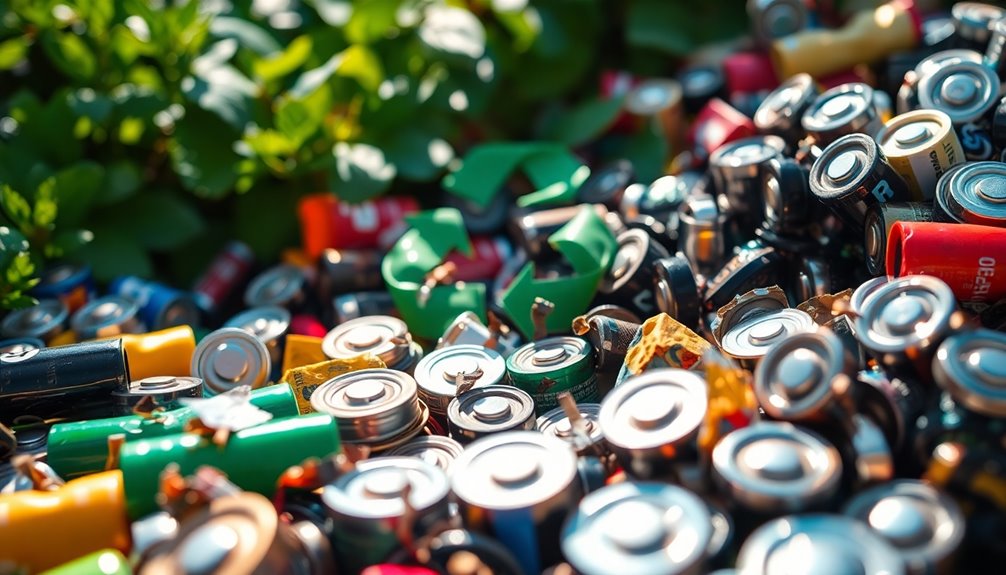Around the world, laws are increasingly placing responsibility on producers for managing battery waste through Extended Producer Responsibility policies. These regulations require companies to take back, recycle, and finance disposal programs for used batteries, encouraging eco-friendly designs and reducing environmental harm. Many countries are evolving their policies to promote sustainable practices, aligning industries with waste management goals. If you stay informed, you’ll discover how these global efforts shape responsible battery use and disposal.
Key Takeaways
- Many countries implement EPR policies requiring producers to manage battery collection, recycling, and disposal.
- Regulations often mandate producer registration, reporting, and financial contributions toward battery recycling infrastructure.
- EPR promotes designing batteries for easier recycling and environmental sustainability.
- Global trends show increasing adoption of producer responsibility laws to reduce hazardous waste and promote resource recovery.
- Consumer participation and take-back programs are critical components of effective battery EPR frameworks worldwide.

Have you ever wondered who’s responsible for managing the environmental impact of batteries once they’re out of use? It’s a vital question, especially as battery consumption skyrockets with our growing reliance on electronics and electric vehicles. This is where extended producer responsibility (EPR) comes into play, shifting the burden of waste management from governments and consumers to the producers themselves. Under EPR frameworks, manufacturers are held accountable for the lifecycle of their batteries, including collection, recycling, and proper disposal. This approach encourages companies to design batteries that are easier to recycle, reducing environmental harm and conserving resources.
Battery recycling is at the core of these regulations. When batteries reach the end of their usable life, it’s not enough to toss them in the trash. Instead, producers are tasked with establishing or supporting recycling programs, making it easier for consumers to return used batteries. Proper recycling prevents hazardous chemicals from contaminating the environment and allows valuable materials like lithium, cobalt, and nickel to be recovered for reuse. Countries adopting EPR policies often require producers to finance or operate battery recycling schemes, which not only helps properly manage waste but also promotes a circular economy. By taking responsibility for the entire lifecycle, producers are motivated to innovate and design safer, more sustainable batteries that generate fewer environmental issues.
Proper battery recycling ensures hazardous chemicals are contained and valuable materials are recovered for a sustainable, circular economy.
Producer accountability is fundamental to effective battery regulations worldwide. Governments are increasingly recognizing that sustainable battery management can’t rely solely on consumer awareness or voluntary programs. Instead, they’re implementing laws that make producers legally responsible for the end-of-life handling of their products. In many regions, this means producers must register, report, and contribute financially to recycling infrastructure. This accountability incentivizes companies to develop batteries that are easier to disassemble and recycle, ultimately reducing the environmental footprint. In some cases, producer responsibility schemes include take-back programs, where consumers can return used batteries directly to manufacturers or designated collection points, ensuring proper handling.
Across the globe, regulations are evolving to make sure companies bear the burden of their products’ environmental impact. These policies aim to create a more sustainable battery industry and protect ecosystems from hazardous waste. As a consumer, it’s important to understand that your choices can influence manufacturer practices—supporting brands that prioritize responsible battery disposal and recycling. Additionally, increasing awareness of environmental stewardship can motivate more companies to adopt sustainable practices. Overall, the shift toward extended producer responsibility and battery regulations reflects a broader commitment to environmental stewardship, ensuring that the benefits of battery technology don’t come at the cost of our planet’s health.
Frequently Asked Questions
How Do Different Countries Enforce Battery Recycling Compliance?
You’ll find that countries enforce battery recycling compliance through strict regulations, cross-border enforcement, and compliance monitoring. Authorities conduct regular inspections and track battery imports and exports to guarantee producers follow rules. Some nations impose penalties for non-compliance, while others use certification systems. By implementing these measures, they aim to hold producers accountable across borders, encouraging responsible recycling practices and reducing environmental impact.
What Are the Economic Impacts of EPR Policies on Manufacturers?
You’ll find that EPR policies increase manufacturers’ cost implications, as you must invest in recycling programs and compliance systems. This can raise production costs and impact your market competitiveness. However, by embracing sustainable practices, you may also gain access to new market opportunities and customer loyalty. While the initial costs are higher, in the long run, EPR can promote innovation and help you stay ahead in an evolving eco-conscious market.
How Are Informal Recycling Sectors Affected by New Regulations?
You’ll notice that new regulations challenge the informal recycling sector by increasing compliance costs and stricter standards, which can push small operators out. This impacts community recycling efforts, as many rely on informal workers for collection and dismantling. While formal systems improve safety and efficiency, the community recycling impacts may include job losses and reduced recycling rates, highlighting the need to balance regulation with support for informal sector challenges.
Are There Exemptions for Small or Local Producers Under EPR Laws?
Many small producers find some relief under local manufacturer policies, which often include small producer exemptions. These exemptions facilitate their obligations, helping them avoid the full scope of EPR laws. If you’re a small or local manufacturer, check specific regulations, as many regions tailor policies to support local businesses and small-scale producers. While exemptions exist, staying informed ensures you meet requirements without unnecessary burdens.
How Do Regulations Address Emerging Battery Technologies Like Solid-State Batteries?
Regulations are increasingly focusing on emerging battery technologies like solid-state batteries by setting specific standards for battery safety and performance. You’ll find that safety protocols are emphasized to prevent hazards, and testing requirements are stricter to guarantee reliability. Policymakers aim to balance innovation with safety, so manufacturers must meet evolving standards for solid-state batteries, promoting safer, more efficient energy storage solutions while addressing potential risks associated with these new technologies.
Conclusion
You might think that global battery regulations and extended producer responsibility are just bureaucratic hurdles, but they actually drive innovation and sustainability. By holding producers accountable, you encourage better design, recycling, and waste management. Curiously, some theories suggest that these policies could even reshape industries faster than market forces alone. So, embracing these regulations isn’t just about compliance—it’s about shaping a cleaner, more responsible future that benefits everyone, including you.









